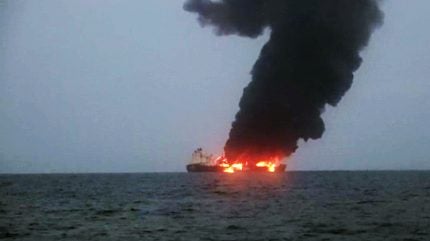
The Greek-owned and flagged oil tanker MV Sounion, which was attacked by Houthi rebels while passing through the Red Sea several days ago, may now be leaking oil.
The claim from the Pentagon comes as the rebels, an Iranian-backed group, have attacked more than 40 commercial ships in the region over the past few months.
According to multiple media reports, the vessels was first attacked by small arms a week ago and was then hit by at least three small missiles.
This caused a fire that left the tanker without engine power, thus unable to move or steer. The ship is reportedly carrying more than one million barrels of crude oil and such a spillage would be one of the biggest in maritime history.
The rebels have so far repelled any attempts at salvage, said the Pentagon in a further statement.
The Houthis control large parts of Yemen and have vowed support for the Palestinians in the current conflict with Israel.
In May, an oil tanker in the region, one of the most important shipping lanes in the world, was hit by an anti-ship missile from the Houthis, although the crew managed to restore power and stay on course.
At the start of the year, the UK called on the Houthis to cease its attacks on shipping transiting the Bab el Mandeb into the Red Sea.
Delivering a speech to the UN Security Council on 3 January, UK Ambassador James Kariuki stated that the “illegal and unjustified” attacks on commercial shipping in the Red Sea should “cease… immediately”.
Issuing a warning, Kariuki said that the UK “will not hesitate to take action to deter threats to freedom of navigation in the Red Sea”.



